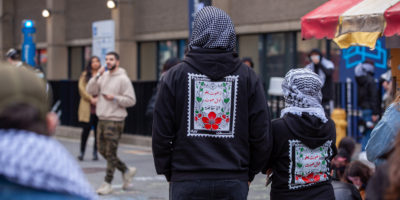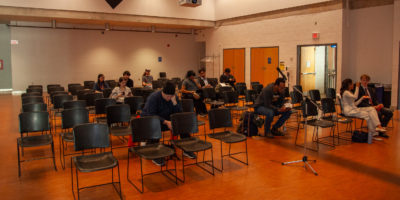Cultural groups trying their darndest to woo new members
| As a new school year begins, Ryerson students can choose to join any of a variety of new cultural groups, representing no fewer than 30 different countries. Despite appearances, the clubs are open to anyone, as long as they are a Ryerson student. Last Thursday, students gathered at Oakham House for the annual Groups and Societies Day. Today’s feature will discuss some of the highs and lows Ryerson’s student groups face when trying to recruit new members. |
Macedonian Students’ Association (MSA)
For the past 5 years, the republic of Macedonia in the former Yugoslavia, has suffered through one of the 20th century’s bloodiest wars. The Macedonian people have also been involved in an ongoing struggle for independence from Greece. Ryerson’s MSA has attempted to shy away from the political situation at home.
“There are always political aspects to any group,” says Tony Globocki, former chair of the group’s executive and now a member. He remembers the problems that arose in 1992, when the group was first created.
“When we started up, the Greek students [members of the Hellenic Students Association] protested. They said their group and our group represented the same people.”
Globocki says that the situation in the Balkans can create conflicts between Greek and Macedonian-Canadians.
“People over here who aren’t directly involved in the war situation tend to talk a lot,” he says. “People are trying to support their own kind, [but in the process] a lot of propaganda goes on.”
Globocki says relations between the Macedonian and Hellenic associations have had their ups and downs over the past four years.
“[When I was chair] I felt I had a good relationship with the president of the Hellenic Students Association. But as of now, there is no dialogue between the two groups.”
The MSA is taking a unique approach to cultural awareness this year. They intend to promote the mother country, while at the same time trying not to ignore their adopted home.
“There’s a generation coming up who has not forgotten that they’re in Canada now. Macedonians are a tightly-knit community. They’re in touch with their culture, but they still realize they’re Canadian. We want to encourage that.”
Muslim Students Association
Here is another group that tries to steer clear of politics. Because of Islam’s negative reputation in the West, the Muslim Students Association has been forced to defend its religion from constant criticism:
“We get a lot of women asking about Islam’s treatment of women,” member Fawad Hasan says. “True Islam provides equality for all women.”
The Muslim Students Association avoids politics, preferring instead to focus on the unifying force of their religion. THey are currently lobbying to have some prayer space set aside for Muslims on campus.
Ryerson’s Arab Students’ Association (RASA)
Sandra Abdelkerim is the first president of the Arab Students’ Association, which received approval as a student group just this past summer. RASA, which already has 45 members,began when several Ryerson Arab students came together at events organized by other Arab student associations.
“A few of us met at social events, and wanted to get together. York and U of T have very strong organizations, and our ultimate goal is to have an umbrella group encompassing all Arab students in Ontario.”
The Arab world is made up of 22 nations, and encompasses Christianity, Islam and even Judaism. To avoid exclusion, RASA remains decidedly secular. “We tend to stay away from religion because of the conflict,” Abdelkerim says. “An association divided won’t stay around for very long.”
RASA’s first general meeting will be held on Wednesday, September 20 at Oakham House from 5-7 p.m.
Filipino-Canadian Association of Ryerson (FCAR)
Theresa Baguio says the Filipino-Canadian Association is looking to change its image.
“We don’t want to be known as just a party group any more,” FCAR’s secretary says. “This year we want to inject some heritage into the group.”
Baguio says FCAR will be promoting Filipino history, to educated students, as well as themselves.
“The whole history of the Phillippines is a coming together of races,” she says. “[We’ve] always struggled for an identity. I don’t even know my exact heritage.”
The mixed heritage of the Phillippines has manifested itself in FCAR’s membership. Baguio says students of various ethnic backgrounds have helped to strengthen the group. “We’re a lot more than just one race. One sixth of last year’s membership was non-Filipino, and one member of our executive is Chinese.”
Ryerson University Korean Students’ Association (RUSKA)
As one of Ryeron’s newest cultural groups, RUKSA has worked hard over the past year to receive accreditation by RyeSAC (Ryerson Students’ Administrative Council.)
“The idea came [about] when six or seven Korean students in the hospitality and Tourism Management program came together last winter,” says president Sue Kim. “There are Canadian as well as Korean student members involved, and some Japanese and Chinese students.”
The group’s goal is to improve school life for students while making valuable friendships. Informal meetings are held on the last Friday afternoon of each month, and the first meeting is scheduled for September 22 at PM Toronto.
Latin American Students Association of Ryerson (LASAR)
Yet another new organization on campus, LASAR began after a meeting between 15 students last March. The two founding members, president Claire Hurtubise and vice president Allison Larrea, noticed a strong Latin American presence at Ryerson and organized the group to meet their needs. Carlos Luque found out about LASAR when he came across one of their pamphlets.
“80 per cent of our members are students,” Luque says. “We also have some alumni and faculty members. We have members from a variety of backgrounds.”
Like many of Ryerson’s student groups, LASAR attempts to remain non- political. However, human rights issues are not ignored.
“We try to make others aware of human rights in the Latin American community,” he says. “If there is a problem, we will try to help out with funding and relief.”
LASAR has several events planned for this semester, including a fiesta to be held this Friday at The Edge. Those who are interested should also look out for Latin Awareness Day, which will be held in Jorgenson Hall on October 12.
Obviously there are many student groups not mentioned here for lack of space. For a complete listing of student groups for 1995-96, consult the RyeSAC Student Handbook and Daytimer, pgs. 35-39. Or drop into the new and improved RyeSAC office in the basement of Jorgensen Hall.
– By Brian Daly with files from Sara Bigelow and Jennifer Long.









Leave a Reply